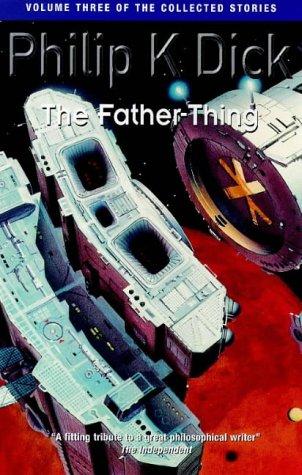Paperback, 400 pages
Published Nov. 24, 2004 by Gollancz.

Paperback, 400 pages
Published Nov. 24, 2004 by Gollancz.
Science fiction fans will find familiar the premise of Philip K. Dick's 1954 short story "The Father-Thing." In it, a young boy, Charlie, discovers that his father is not actually his father. The man in his house who comes home from work, kisses his mother, sits down to dinner, makes comments about his day at the office may look and talk like the real Mr. Walton, but Charlie knows better. He alone knows the hideous secret: that his real father has been killed, and that an alien now inhabits his body, and has usurped his life. It is no longer his father but the "Father-Thing."It is a familiar premise but an interesting one. Works like The Thing and, most famously, Invasion of the Body Snatchers, were especially popular in the 1950's, expressing the fear that people are not what they seem to be. The idea that something sinister may be …
Science fiction fans will find familiar the premise of Philip K. Dick's 1954 short story "The Father-Thing." In it, a young boy, Charlie, discovers that his father is not actually his father. The man in his house who comes home from work, kisses his mother, sits down to dinner, makes comments about his day at the office may look and talk like the real Mr. Walton, but Charlie knows better. He alone knows the hideous secret: that his real father has been killed, and that an alien now inhabits his body, and has usurped his life. It is no longer his father but the "Father-Thing."It is a familiar premise but an interesting one. Works like The Thing and, most famously, Invasion of the Body Snatchers, were especially popular in the 1950's, expressing the fear that people are not what they seem to be. The idea that something sinister may be lurking beneath a facade of suburban complacency is certainly an important component to Jack Finney's novel, Invasion of the Body Snatchers and the movie of the same name. But while that work is largely about the country's paranoia and suspiciousness during the McCarthy years, Dick's story has a much more personal focus. "The Father-Thing" is more personal because it is not about the invasion of a community, but of a family. The alien takeover serves as a metaphor for estrangement, as the "Father-Thing" represents the agency-driven by seemingly inscrutable motives-that irremediably damages the household and the family's stability. Dick's story, then, is both a chilling science fiction tale and a emotionally resonant work about a child's coming to grips with a home in turmoil. Where Charlie turns when he finds himself an outcast from his home is somewhat surprising, and it reveals much about Dick's ideas about community and exile.